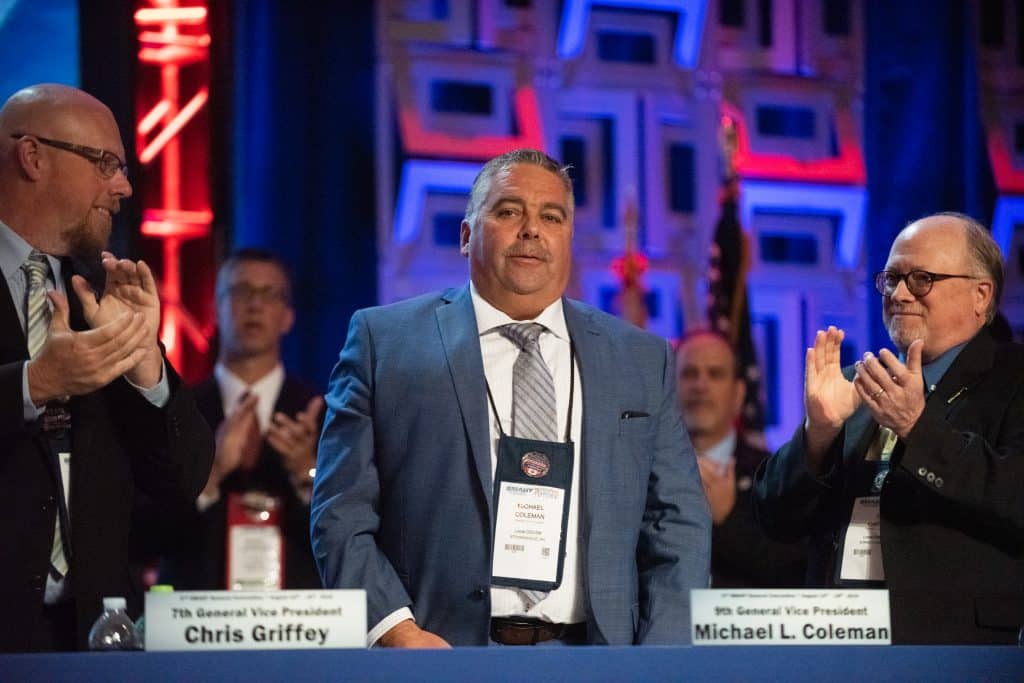SMART General President Michael Coleman addressed attendees at the SMART Transportation Division National Training Seminar (NTS) in Cleveland, Ohio, on July 9th, reiterating the solidarity that powers our union and committing himself fully to winning the pay, dignity, safety and protections SMART-TD members deserve.
“We stand for our members, and we will fight to the bitter end for the membership,” he declared to a fired-up SMART-TD audience.
GP Coleman: “You have the ‘why’”
Coleman readily told NTS attendees that, after 40 years as a union sheet metal worker and union officer, he was less familiar with the transportation side of SMART when he first joined the International in 2019. But having worked alongside SMART-TD President Jeremy Ferguson and his team since, including the SMART-TD legislative staff in Washington, DC, he told attendees: “I’m proud to stand up here with all of you under the banner of SMART, because that’s who we are. We are one union. And make no mistake about it … we are stronger for it.”
Coleman attended various breakout sessions during the NTS’s first day, hearing about the fights SMART-TD officers are embroiled in across the United States.
“There was an overarching message,” he said. “And that is: We are in a fight, and we are in a fight every single day. But I’ll tell you this. After witnessing what I’ve witnessed, there’s not another group that I would rather go into a fight with than this group right here and our brothers and sisters on the sheet metal side.”
The reason? Because SMART has our “why;” our reason for fighting. Coleman referred to the writing of author Simon Sinek, whose theory of a “golden circle” of leadership posits that organizations and leaders are constantly dealing with the “what” — the results they achieve — the “how” — how they achieve those results — and, most importantly, the “why” — the reason that “what” and “how” even exist.
Our “why” is the members, Coleman said. And that “why” is more powerful than any reason our enemies could have.
Representing SMART members through thick and thin
SMART-TD fights on behalf of its members day in and day out, Coleman told attendees. And the attacks are relentless.
It was only two years ago that the freight rail carriers said, on the record, that “labor does not contribute to profits.”
Management is slow to react to threats on operator safety and rarely takes the expertise of local unions into account when searching for solutions to violence on public transit.
Billionaire shareholders constantly seek to undermine working conditions and safe staffing in their pursuit of “efficiency” and profit in the transportation industry.
“I ask you – it’s a simple question – what is our crime?” Coleman posed to NTS attendees. “[Is it] that we fight for safety and dignity in the workplace? … Is it that we worry about our members and their families, and we make sure that they can provide a decent living, a home, and raise their family with dignity? Is that the crime? Or is it because when it comes time for us to retire, we want to be able to retire with some dignity as well?”
Recently, he added, SMART-TD hasn’t only battled entities like the Class I railroad carriers. Even other figures and organizations within rail labor have taken to disrupting the coordination and solidarity so desperately needed in national rail contract negotiations.
“President Ferguson and I are on the same page: We don’t want this fight. We do not want this fight. We want to join forces and fight those enemies I talked about before,” he said.
The challenges in our path make events like the NTS even more important. With trainings at the national and regional level, SMART-TD union officers can equip themselves with the tools and knowledge needed to represent members to the fullest, whether negotiating strong bus contracts, winning railroaders back pay or bargaining on attendance policies and paid sick leave.
“We will win,” Coleman concluded, “because of you. Because of us. We’re going to outthink them. We’re going to outwork them. And most importantly, we’re going to out-why them, because that’s what we stand for. We stand for our members. … I appreciate every single one of you for doing that every single day.”
